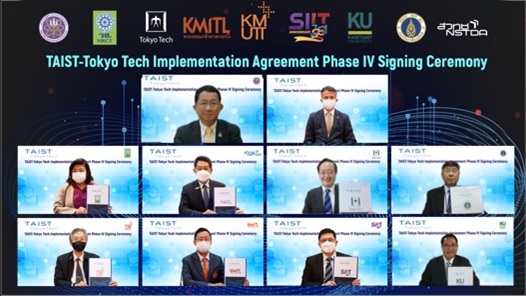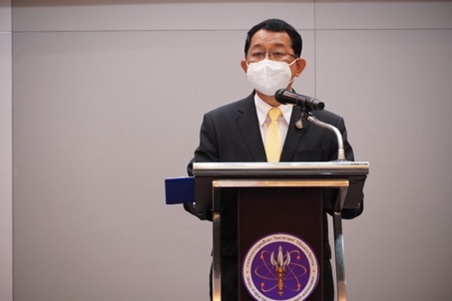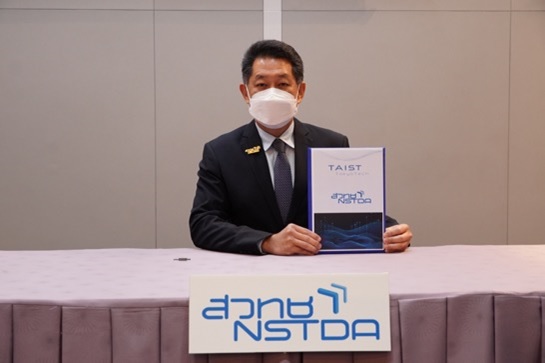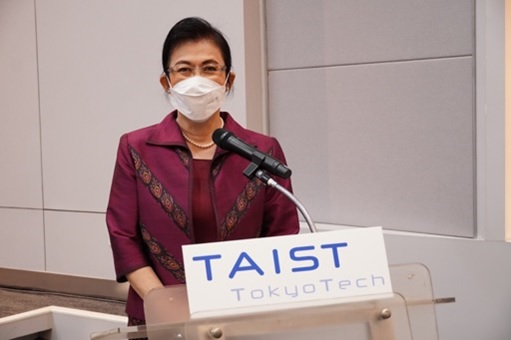On 19 April 2022, NSTDA, the National Research Council of Thailand (NRCT), five Thai universities and Tokyo Institute of Technology (Tokyo Tech) entered the TAIST-Tokyo Tech Implementation Agreement Phase IV (2022-2027). TAIST-Tokyo Tech is a graduate program established with a prime objective to produce world-class researchers and high-level engineers. Five Thai universities are King Mongkut’s Institute of Technology Ladkrabang (KMITL), Sirindhorn International Institute of Technology (SIIT), King Mongkut’s University of Technology Thonburi (KMUTT), Kasetsart University (KU) and Mahidol University (MU). TAIST-Tokyo Tech currently offers three master’s degree programs - Automotive and Advanced Transportation Engineering, Artificial Intelligence and Internet of Things, and Sustainable Energy and Resources Engineering – and a certificate program in rail transportation.

The signing ceremony was presided by MHESI Permanent Secretary Prof. Dr. Sirirurg Songsivilai with co-signers including NRCT Executive Director Dr. Wiparat De-ong, Tokyo Tech President Prof. Dr. Kazuya Masu, KMITL Dean of School of Engineering Assoc. Prof. Dr. Somyot Kaitwanidvilai, KMUTT President Assoc. Prof. Suvit Tia, SIIT Director Prof. Pruettha Nanakorn, KU President Dr. Chongrak Wachrinrat, MU President Prof. Banchong Mahaisavariya, M.D., and NSTDA President Dr. Narong Sirilertworakul. Mr. Oba Yuichi, Deputy Chief of Mission from the Embassy of Japan graciously attended the ceremony to offer his congratulations.

In his remarks, Prof. Dr. Sirirurg Songsivilai stated that the Ministry of Higher Education, Science, Research and Innovation (MHESI) is tasked with a mandate to drive the manpower development and research & innovation for the national development and competitiveness enhancement, aiming to transform Thailand into an innovation-based economy. MHESI has been working with higher education institutes to redesign courses to deliver workforce that will meet the requirements of national development and responsive to global trends. The cabinet recently approved THB 143.73 billion budget to MHESI for FY 2023, making MHESI in the top six ministries with the highest budgetary allocations. The fund will be spent to drive national agendas such as the Bio-Circular-Green Economy (BCG) Model and to build competitiveness for sustainable development.

NSTDA President Dr. Narong Sirilertworakul remarked that NSTDA has implemented a range of programs to support training and development of human resources in science and technology. Examples include Junior Science Talent Project (JSTP), Young Scientists and Technologist Program (YSTP), Thailand Graduate Institute of Science and Technology (TGIST) and TAIST-Tokyo Tech. Though the programs vary in mechanisms and target groups, they have a common goal which is to develop manpower in science and technology to support the national development.

NSTDA Executive Vice President Dr. Chadamas Thuvasethakul described the arrangement of TAIST-Tokyo Tech Phase IV. Tokyo Tech provides academic instruction and research advice, whereas Thai universities offer an academic framework, academic staff to oversee and guide students, as well as grant degrees or certificates to the successful candidates. NRCT provides tuition and stipend for enrolled students, while NSTDA acts as an overall program administrator.
TAIST-Tokyo Tech has been in operation since 2007. Since its inception, the program has produced 460 graduates. 60% of the graduates now work in industry, 20% in government organizations, and 9% currently pursuing doctoral degree in Thailand and abroad.
